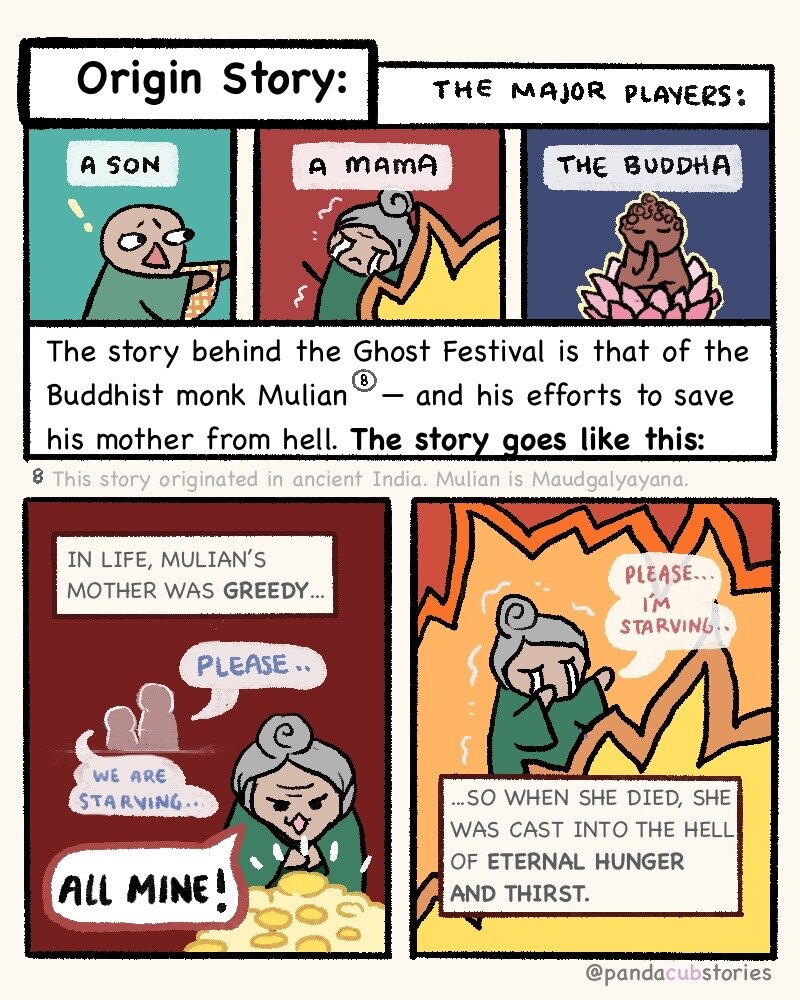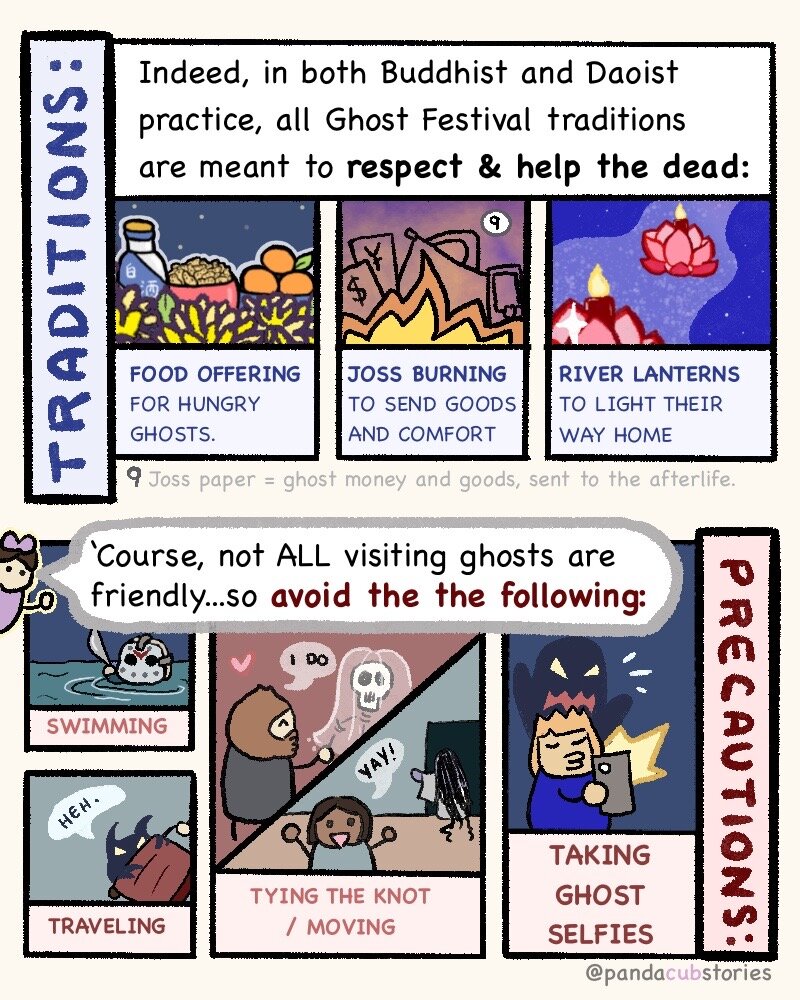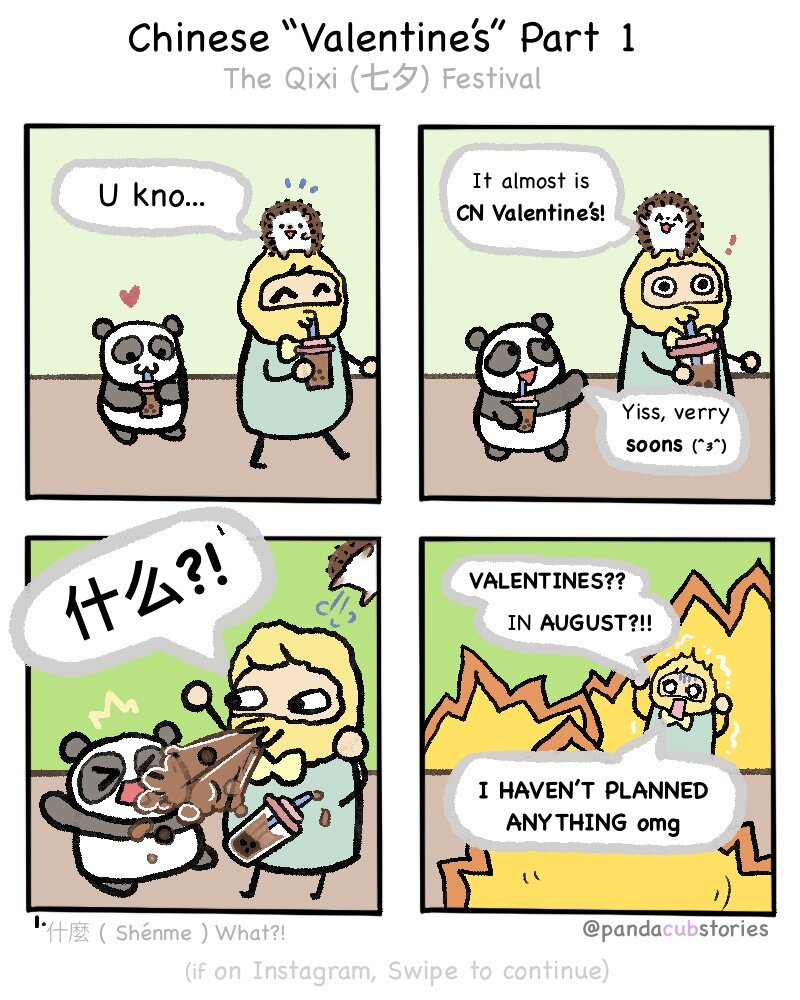ASDFGHJ!!!
We got our real-official-media mention! *squeals in gibberish *









BAIDU | 中元节
OFF THE GREAT WALL | The Origins of the Ghost Festival
LEARN HOW TO CHINESE | Halloween in China
WIKIPEDIA | Ghost Festival
CHINA DAILY | Different Shades of Western and Chinese ‘Ghost Festivals’
If you’ve come hither from Panda’s insta, you’ll know this post is split into 两个parts! Part 1 (below) provides a primer on the Qixi Festival. Part 2 is my (expanded) retelling of the Legend of Qixi — the story of two star-crossed lovers Niu-lang and Zhi-nv. Hope y’all enjoy!
- Linda






The Oxherd and The Weaver Maid
牛郎织女
by Linda Yi
*
On the seventh eve
of the seventh moon,
a mighty river of silver
and starlight shall
appear in the sky.
On opposing banks
shine the light
of two, lonely, stars.
This is their tale.
Long ago, when the moon was but a young moon, there lived in the heavens two stars.
The first star was the youngest of seven sisters. She was a weaver by trade and loved her craft. No one, in heaven nor on earth, could match her skill on the loom. The second star was a herdsman, tasked with tending to heaven’s oxen. Tireless was he, riding astride the mighty Taurus, as he guided the herd to graze where the jade grass grew.
At day’s break, the first star’s nimble fingers were already busy with her loom. From those fingertips flowed the most brilliant of sunrises and the very richest of sunsets. And as the first star wove sunsets and sunrises into being, the second star gazed at her from afar.
Each morning, bathed in the light of her newly woven dawn, he would begin his task. Each evening, under the warm glow of the weaver’s sunset, the herdsman would return – just in time to see her place her final stitch.
I cannot say how many days, moons, years passed in this manner (for time flows differently[1] in the heavens than it does on earth). Yet one thing was certain:
Zhao-xi xiang-chu[2], the two stars fell in love.
*
…Alas, theirs was a forbidden love.
For all stars have a heaven bound path – and their paths were never meant to cross. The second star was stripped of his immortality and cast to the mortal realm below.
The weaver’s heart ached as the last of his light faded into the clouds, and as his light dimmed, hers did as well. Yet what could a single star do against heaven’s will? And so she continued to weave: day after day,
night after night,
spinning skies of silver and gray,
threaded with shining tears.
—
[1] According to lore, one day in heaven = one year on earth
[2] 朝夕相处 (Zhāoxìxiāngchǔ) idiom. Together from morning to night; associate closely
When the banished star fell to earth, he was reborn to a life of toil. He was now a peasant boy, by the name of Niu-lang[3]. Niu-lang was the second son to an old farmer and his wife. Niu-lang’s brother was a miserly man. When their elderly parents died, the elder brother cast the younger out with nothing save the clothes on his back, and an ox so old and skinny that its bones stuck out in odd angles when it walked.
Niu-lang and his ox wandered from village to village, working in fields when work was offered and sleeping beneath the open sky. Still. The boy was happy. Although sometimes, as he lay gazing up at the stars, Niu-lang felt a peculiar tightness in his chest. A pull, as if from some invisible thread, tugging at his heart. And then, wearied from a day of work, he’d drift into slumber, dreaming of bright moons and forgotten stars.
—
[3] 牛郎 (Niú láng) literally: Oxherd
As Niu-lang toiled in the fields below, the weaver continued her own task in the heavens above. Yet her sunrises were never quite as brilliant – her sunsets never quite as rich – as they had been before. Her six sisters, troubled by this change, turned to the Queen Mother of the Western Skies[4].
“Queen Mother,” they pleaded, “our sister weaves and weaves, never taking leave of her loom. We fear her colors will one day run dry. Please, Queen Mother, may we bring her to the green lands below – to bathe in its cool streams and drink its morning dew?” The Queen Mother listened, face calm and implacable. Yet, as heaven is not without mercy, she granted them their request.
And so the seven sisters descended to earth as soft summer rain, their gossamer cloaks fluttering in their wake, a rainbow of reds and peach, of yellows and greens and blues.
—
[4] 西王母 (Xīwángmǔ) Queen Mother of the West
As for Niu-lang, many seasons had passed, and the boy grew into a quiet young man. On the day of the sisters’ descent, the old ox turned to Niu-lang and spoke:
“Hearken, young master, and listen well – you have been kind to this old ox and I now wish to repay in kind. Climb on my back and I shall take you to that rainbow to our west. Follow that rainbow to its end and you shall find the oldest of all trees. On its branches you shall find a cloak of the finest silk. Take the cloak and bring it back to me. If you do exactly as I say, you shall finally remember what it is that you have lost.”
At these words, Niu-lang climbed onto the ox’s back. He did not stop to wonder that the old ox had spoken to him – for these were the days when the moon was still young, and when spirits and gods walked among men. And just as he had promised, the old ox bore the youth due west, where they saw a brilliant rainbow arching into the deep woods...
As Niu-lang made his way into the winding woods, six sisters danced and laughed in the crystal stream that ran through the heart of the forest. The seventh, youngest of them all, sat at the edge of the brook, listening to a songbird call sweetly to his mate, who called back from the bough of a nearby tree. On the same branch hung seven cloaks of silk, diaphanous folds rippling in the air. Although there was no breeze, the cloaks fluttered and danced, as if eager to take flight once more.
When the six elder sisters had danced their fill, they donned their cloaks and prepared to take flight. “Come, youngest sister, for it is time to return,” they called – yet their youngest sister made no move toward her own silks. “I wish to stay,” the Weaver star said, “for but a moment more.” She gazed toward the stream, eyes softening at the little silver fishes darting to and fro just beneath the surface.
And so it was that six sisters returned to the sky, leaving the seventh to linger for but a moment more…
As the Weaver lingered at the edge of the brook, the day’s light began to fade and a soft mist rose. The youth who had entered the forest at his old ox’s behest had begun to suspect that he was lost. Though he had taken care to drop pebbles along the way to mark his path, the mist had thickened so that Niu-lang could barely see the path before him. But then, just ahead, he thought caught a glimpse of color. Half blind, Niu-lang walked with outstretched arms, feeling his way toward that flash of rose.
And there it was: floating before him, a robe woven of the finest silk. Not the gloam of the forest nor the blanket of mist could lessen its vibrance. The robe fluttered and shone, a brilliant work of soft rose and warm peach, stitched together with glimmering threads of gold. Niu-lang lifted the cloak, gently, lest it snag on the gnarled branches of the oldest of all trees. No sooner did he do so, the thick mist began to clear, revealing a small path of pebbles leading back to the entrance of the of the woods.
When Niu-lang emerged from the forest, it was nearly twilight. The old ox waited, patiently, as his master walked toward him, carrying a cloak of rose and gold. “I have done what you’ve asked,” Niu-lang said to the ox, placing the cloak softly upon its back. “So you have,” replied the ox. “Now, we wait.”
And they waited.
They waited until the first stars began to wink in the heavens above. The youth and the ox waited until the sky deepened into midnight blue. When the moon shone silver directly overhead, he heard a voice say:
“You, boy. Was it you who took my cloak of silk?”
Her voice was soft like a summer’s breeze, and it tugged at his heart, a familiar ache. He turned to see a maiden clad in a shift of rising dawn. Her skin glowed pearlescent under silver moonlight. As he gazed at her, his heart warmed – then filled. And Niu-lang finally remembered what it was that he had lost.
When the boy turned to face her, the weaver’s heart shook. For though his features had changed, she knew him at once. Her heart warmed – then filled. And it brimmed over in tears that fell from her eyes.
*
Our tale does not tell us exactly what the two lovers, reunited once more, said or did that night. All we know is that the weaver of sunrises and sunsets did not return to the heavens that night… nor any of the nights that followed.
Niu-lang and Zhi-nǚ[5], as she was now known, settled in a nearby village. At dawn, he’d set out with his loyal old ox, to till the little plot of land they now called their own. And at dusk he’d return just in time to see her place the final stitch upon her loom. And from her loom sprung the most beautiful of silks, with colors that rivaled the most brilliant of sunrises and the richest of sunsets…
—
[5] 织女(Zhīnǚ) Weaver maid
Many seasons passed as Zhi-nǚ tilled the land and Zhi-nǚ worked her loom. By their third harvest, they had also become parents to a daughter with eyes that shone like stars, and to a baby son with cheeks that glowed like dawn. Word of Zhi-nǚ’s skill at the loom had spread, and people traveled from far and wide in hopes of purchasing a bolt of her silk.
News of a maid who wove silks that rivaled heaven’s skies even reached the gates of Nan-Tianmen[6], the point where the mortal realm reaches the sky. Upon hearing the news, the Jade Emperor[7] – divine ruler of the celestial pantheon – ordered the weaver star’s capture.
The skies darkened and thunder roared. A celestial squadron of grim-faced stars descended, swept Zhi-nǚ up in a tempest, leaving behind nothing but an empty loom.'
—
[6] 南天门 (Nán tiānmén) Literally: south-heaven-gate. This is the gateway between the mortal and heavenly realms.
[7] 玉帝 (Yù dì) Jade Emperor
Niu-lang returned from the fields, only to find his terrified children crying for a mother who was no longer there. Niu-lang realized what had passed and wept bitter tears. He shouted to the wind for it to bring her back, but the wind howled in derision and whipped cruelly at his face.
Then, the old ox spoke for the very last time. I shall carry you, master, one final time. When I die, make a cloak out of my leather. With this cloak you shall be able to take to the sky. And with those words, the old ox – who had been the mighty Taurus – cast off his mortal shell and died.
Niu-lang fashioned a heavy cloak out of Taurus’s leather, and swung it over his shoulders. Carrying his daughter on his right shoulder, and his son on his left, Niu-lang soared into a darkening sky…
Niu-lang flew swift and sure – and with each passing moment he gained upon Zhi-nǚ’s captors. He came so close as to see the tears glinting in her eyes – so close that she could hear the cries of her daughter and her son. Just as he was about to reach her, a ribbon of lighting tore across the sky.
The Queen Mother of the West appeared, eyes steely with wrath. She plucked a silver hairpin from her head. With a sweep of her arm, she cast the talisman between the two lovers. Suddenly, the heavens between them split, and there between them appeared a great river of silver and stars. And no matter how they tried, neither Niu-lang nor Zhi-nǚ could cross to the other side. So great was their sorrow that it shook the very earth. The bird folk, belonging to both land and the sky, too to the air – their songs echoing the two lovers’ despair.
The Queen Mother heart softened, yet she too had her task. And those who flout heaven’s will must pay a bitter price. After a moment, the Queen Mother spoke: “You shall gaze upon each other from distant banks, to see – but not touch – save for one night a year. On seventh night of the seventh moon, your stars may again align. Upon a bridge of feathers and wings, your family may reunite – but for a single night.”
And that is the tale of the oxherd Niu-lang and the weaver maid Zhi-nǚ.
On the clearest of nights, look to the sky. There you might see a great silver river[8], milky with stars. On opposite banks shine the light of two bright stars: one is Zhi-nǚ, the other Niu-lang. By Niu-lang’s side wink the lights of two smaller stars – a girl with twinkling eyes, and a boy with cheeks of rose.
And on the seventh eve of the seventh moon, birds[9] flock from far and wide. For the night of Qixi they form a bridge of feathers and wings. Upon that feathered bridge, a family reunites… yet only for one night.
—
[8] This the is 银河 (Yínhé), or the Milky Way.
[9] In older versions, the birds are magpies (or 喜鹊)
My retelling of the tale of Niu-lang and Zhi-nǚ differs from the version I grew up with. In the tale I remembered, Niu-lang steals Zhi-nǚ’s robe (while she and her sisters are bathing), and refuses to return it until she becomes his wife. I quite disliked this plot point, but also felt conflicted about “sanitizing” an old tale. However, in researching this tale, I realized that there were already many variations of of Niu-lang and Zhi-nǚ’s tale. In fact, the version I’d grown up with was already an amalgamation of previous iterations. At the risk of boring the pants off of you, here’s a super brief summary of the different versions I found:
Version 1: Two stars…in time out.
Zhi-nǚ and Niu-lang were stars to begin with. Zhi-nǚ was a workaholic who never left her loom. Her father, the sun god, decides to marry her off to her neighbor (aka Niu-lang), to loosen her up a bit. Lo-and-behold, the two fall in love, and she begins to shirk her responsibilities. Daddy gets mad and punishes the two lovers with separation. (In a variation of this version, the Sun god orders the magpies to form a bridge every 7 days, hence allowing them to see each other once a week. Unfortunately for the couple, the magpies mishear… and instead of once every 7 days, they form a bridge once a year, on the seventh day of the seventh month. Woops.)
Version 2: Reward for Filial Piety
There was once a poor student named Dong Yi. Although he was poor, he was very filial (a super A+ virtue in ancient China). As a reward for his filial piety, the god sends a fairy with magical weaving skills to help him gain some moolah. She churns out luxury silks that make Dong Yi a pretty penny. After 100 days, she leaves (as she has completed her task).
Version 3: Swan Maiden Trope
(Not necessarily original to Chinese mythology) Guy meets girl – realizes she’s a fairy/magical maiden. Said magical maiden can fly (or transform into a form that can fly, like a swan). However, she can do so only through a magical garment (like a cloak of feathers). Guy steals/hides said garment and girl (is forced to) become his wife. After a number of years (often after bearing him children), magical girl recovers her cloak (aka her freedom) and flies off into the sunset – never again to return.
Version 4: the version I grew up with.
The version of the tale I grew up with is essentially an amalgamation of the previous three tales. Just like in the legend of Dong Yi, the tale centers around the relationship between a mortal and an immortal. However, it takes the “garment stealing” trope from version three along with the romance element of version one, and essentially provides us with an epic romance with male chauvinistic undertones.
Panda’s Version:
I chose to base my retelling (mostly) around version 4 – after all, we rarely escape our direct influences! And I am a sucker for bittersweet romance. I hope that this retelling is faithful to the tales that came before it, and also offers something new!
- Linda, Panda and Hedgie